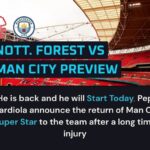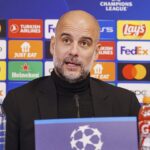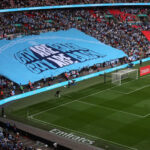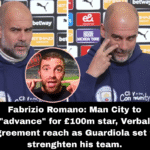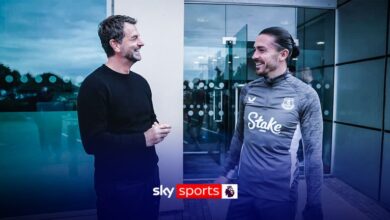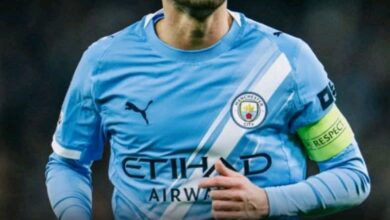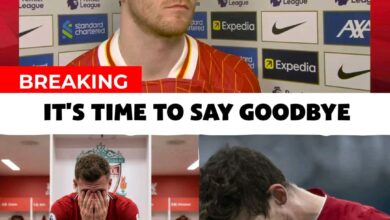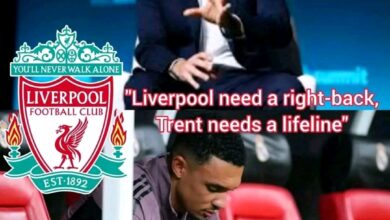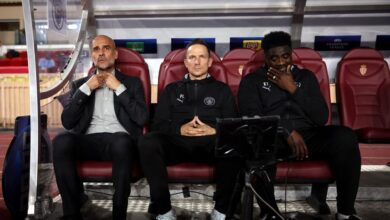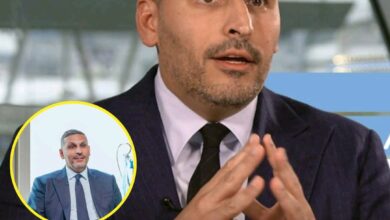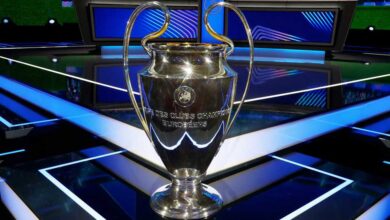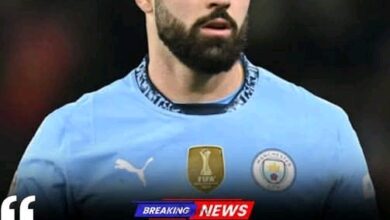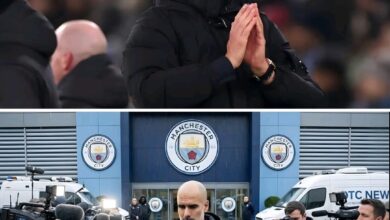Man City attempting to re-sign “titanic” £50m star

In the warm spring sunshine at Wembley Stadium, Manchester City continued their remarkable cup journey with a composed 2-0 victory over Nottingham Forest, securing their third consecutive FA Cup final appearance. As the final whistle echoed around the iconic venue, Pep Guardiola’s subtle smile betrayed a complex mixture of emotions—satisfaction at the immediate triumph tempered by the broader challenges of a season that has fallen short of the club’s extraordinary standards. For a manager and institution accustomed to domestic dominance, the FA Cup now represents more than mere silverware; it offers a redemptive conclusion to a campaign defined by unexpected setbacks and the end of an unprecedented Premier League reign.
A Season of Transition
The 2024/25 season has marked a significant inflection point in Manchester City’s recent history. After four consecutive Premier League titles—a feat never before accomplished in English football—City’s grip on domestic supremacy has finally loosened. Their extraordinary run, which began in the 2020/21 season and continued through to 2023/24, redefined expectations around consistency and excellence in the modern game. However, as with all great dynasties, change eventually becomes inevitable.
The forthcoming departure of Kevin De Bruyne represents the most visible symbol of this transition. The Belgian maestro, whose vision and technical brilliance have orchestrated City’s play for nearly a decade, leaves behind a legacy of magnificence and a creative void that cannot easily be filled. His exit signals the conclusion of a glorious chapter in the club’s history, one defined by his telepathic understanding with teammates and his unparalleled ability to unlock the most stubborn of defenses.
But De Bruyne’s departure is merely the most prominent among several expected exits as the club navigates Financial Fair Play regulations while simultaneously refreshing an aging squad. The coming months will likely witness additional departures from the Etihad as City attempts to balance their books and prepare for the next phase of their ambitious project.
January Foundations
Anticipating this period of transformation, City’s hierarchy demonstrated characteristic foresight with their January transfer activity. The acquisitions of Omar Marmoush, Nico Gonzalez, Vitor Reis, and Abdukodir Khusanov have been carefully calculated investments intended to ease the transition into a new era. These signings reflect the club’s evolving recruitment philosophy—identifying emerging talents capable of adapting to Guardiola’s sophisticated tactical framework while offering long-term value.
The early integration of these players has provided them valuable months to acclimate to England, English football, and Guardiola’s demanding methods. Marmoush has already displayed flashes of the clinical finishing that attracted City’s attention, while Gonzalez’s technical security and positional intelligence suggest a player perfectly suited to the club’s possession-oriented approach. Both Reis and Khusanov have been more gradually introduced to first-team action but have shown promising signs during their limited minutes.
This midseason reinforcement represents merely the initial phase of a more comprehensive squad restructuring. As summer approaches, the focus inevitably turns to how Guardiola will further reshape his team to recapture domestic supremacy while pursuing the European glory that has frequently eluded him during his City tenure.
The Pedro Porro Pursuit
According to recent reports from Football Insider, Manchester City’s transfer strategy may feature an intriguing element of circularity, with the club exploring the possibility of re-signing Pedro Porro from Tottenham Hotspur. The Spanish right-back’s potential return to the Etihad would represent a fascinating acknowledgment of his development since leaving the club without making a single first-team appearance.
Porro initially joined City from Girona in the summer of 2019 but found his pathway to senior football blocked by established options in his position. His subsequent journey took him to Sporting CP in Portugal, where his performances attracted Tottenham’s attention. Since completing a £39 million permanent move to North London in the summer of 2023 following an initial loan period, Porro has established himself as one of the Premier League’s most dynamic attacking full-backs.
Now valued at approximately £50 million by Tottenham, Porro would represent a significant investment for City. However, the club’s reported interest reflects both their recognition of the player’s development and their urgent need to address a positional weakness that has emerged this season.
The Right-Back Conundrum
Kyle Walker’s departure to AC Milan created a void at right-back that has required improvisation throughout the current campaign. The deployment of Matheus Nunes—primarily a central midfielder—in this position underscores the lack of specialized options available to Guardiola. While the Portuguese international has demonstrated commendable versatility, his limitations in the role have occasionally been exposed against high-level opposition.

This situation explains City’s apparent interest in Porro, whose combination of defensive reliability and attacking enterprise would provide a more natural solution. At 24 years old, the Spaniard offers both immediate quality and long-term value, aligning perfectly with the club’s preference for players entering their prime years.
The Trent Alexander-Arnold Comparison
Perhaps the most compelling aspect of Porro’s potential acquisition is his stylistic similarity to Liverpool’s departing right-back, Trent Alexander-Arnold. According to data from FBref, Alexander-Arnold ranks as the most comparable player to Porro across Europe’s top five leagues—a statistical affirmation of their shared attributes.
Alexander-Arnold’s Liverpool legacy has been defined by his revolutionary interpretation of the right-back position. With 113 goal contributions across 351 appearances, he has redefined expectations regarding a full-back’s offensive output. His crossing ability, set-piece expertise, and visionary passing have compensated for occasional defensive vulnerabilities, establishing him as one of the world’s most influential players from a traditionally less glamorous position.
Porro exhibits many of these same characteristics, albeit at a slightly less extraordinary level. His attacking instincts are evident in the statistical parallels with Alexander-Arnold this season:
- Goals and assists: Porro (8) vs. Alexander-Arnold (9)
- Shots per 90 minutes: Porro (1.35) vs. Alexander-Arnold (1.69)
- Crosses attempted: Porro (191) vs. Alexander-Arnold (142)
- Carries into the final third: Porro (40) vs. Alexander-Arnold (35)
These numbers illustrate Porro’s significant offensive contribution from right-back, making him an ideal candidate for Guardiola’s system, which frequently utilizes full-backs as crucial components in build-up play and attacking sequences.
Tactical Implications Under Guardiola
Guardiola’s tactical evolution at Manchester City has consistently demonstrated his willingness to reimagine positional roles. From Joao Cancelo’s inverted full-back role to Philip Foden’s development from traditional winger to fluid attacking midfielder, the Catalan coach has repeatedly shown his capacity to mold players according to his evolving vision.
Porro’s potential integration into this framework offers fascinating possibilities. While his attacking tendencies align with Guardiola’s preference for technically proficient full-backs capable of contributing to possession phases, his defensive positioning would require careful management within City’s overall structure.
The solution likely lies in the asymmetric defensive arrangements that have characterized much of Guardiola’s tenure. By balancing Porro’s forward forays with greater defensive conservatism from the opposite full-back or deploying a defensive midfielder to cover lateral spaces, City could harness Porro’s offensive capabilities while mitigating potential defensive vulnerabilities.
Furthermore, Porro’s comfort in advanced areas would provide valuable width in attacking scenarios, potentially creating more central space for City’s technically gifted midfielders and forwards. His crossing ability—evidenced by his impressive output this season—would offer an alternative avenue of attack against deep defensive blocks, a recurring challenge for Guardiola’s possession-oriented approach.
Financial Considerations and Negotiation Dynamics
While the footballing logic behind pursuing Porro appears sound, the financial aspects present greater complexity. Tottenham’s reported £50 million valuation represents a substantial premium on the £39 million they paid just last year—a reflection of both Porro’s consistent performances and the premium commanded by Premier League-proven talents.
For City, justifying such an outlay requires balancing immediate need against long-term value. At 24, Porro offers the potential for at least five seasons at his peak level, potentially amortizing the investment over a substantial period. However, with Financial Fair Play constraints becoming increasingly restrictive and several positions potentially requiring reinforcement, every allocation decision carries opportunity cost implications.
The negotiation dynamics also present challenges. Tottenham Chairman Daniel Levy has established a formidable reputation as a demanding negotiator, particularly when dealing with Premier League rivals. Reports suggesting Tottenham will “strike a hard bargain” align with Levy’s historical approach to player sales, where maximizing financial return often takes precedence over facilitating smooth exits.
Moreover, the unusual nature of pursuing a player previously deemed surplus to requirements adds another layer of complexity. City’s willingness to pay a substantial premium for a player they once possessed reflects changing circumstances and personnel but might create leverage for Tottenham in negotiations.
The Broader Summer Strategy
While Porro represents an intriguing potential addition, his acquisition would form just one component of a more comprehensive summer strategy. The expected departure of several established first-team players—beyond the already confirmed exit of De Bruyne—necessitates a multi-faceted approach to reinforcement.
The central midfield represents an obvious area requiring attention, with De Bruyne’s creative influence impossible to replace through a single signing. City’s approach will likely involve redistributing creative responsibility across multiple positions rather than seeking a direct replacement—a philosophy consistent with their gradual adaptation following previous key departures like David Silva and Sergio Agüero.
The center-forward position may also require consideration despite Erling Haaland’s continued presence. The Norwegian’s injury absences this season exposed a lack of specialized alternatives, with Julian Alvarez preferred in a deeper role and other forwards better suited to wide positions. A complementary striking option would provide tactical flexibility and necessary rotation options through a congested calendar.
Defensively, uncertainty surrounding the futures of several senior center-backs suggests potential activity in this area. While Ruben Dias remains a cornerstone, the long-term availability of others cannot be guaranteed, creating a need for both immediate quality and developmental prospects.
This multi-positional approach will test City’s recruitment department and financial planning. The club’s leadership must balance immediate competitive needs against long-term sustainability, all while navigating increasingly stringent financial regulations that have already led to charges that remain unresolved.
The Psychological Dimension
Beyond tactical and financial considerations, Guardiola faces the substantial psychological challenge of reinvigorating a squad accustomed to domestic supremacy. The loss of the Premier League title—especially to historic rivals—represents unfamiliar territory for many within the current group, potentially creating uncertainty where confidence once reigned unchallenged.
The FA Cup final offers an immediate opportunity to restore winning momentum and conclude the season with silverware. Victory would provide tangible evidence that this team remains capable of success at the highest level, offering psychological reinforcement heading into a summer of change.
More broadly, Guardiola’s messaging throughout this transition will prove crucial. His decision to extend his contract until 2027 provided important stability amid growing uncertainty, signaling his continued belief in the project and his commitment to overseeing this next evolutionary phase.
Conclusion: Building the Next Dynasty
As Manchester City prepare for their FA Cup final while simultaneously planning for significant summer changes, they stand at a fascinating crossroads in their modern history. The potential pursuit of Pedro Porro symbolizes their approach to this transitional moment—seeking players with technical profiles aligned to their established philosophy, but whose peak years remain ahead rather than behind them.
The conclusion of their Premier League hegemony, while disappointing, provides an opportunity for renewal and reinvention. The departure of iconic figures like De Bruyne, while emotionally significant, creates space for emerging talents to establish themselves and for tactical innovation to flourish.
For Guardiola, this represents perhaps his most significant challenge since his initial seasons at the Etihad, when he worked to implement his distinctive vision amid skepticism about its suitability for English football. Having answered those questions emphatically through unprecedented domestic dominance, he now faces the different challenge of rebuilding from a position of established success.
The pursuit of Pedro Porro—if successful—would represent just one element of this broader renewal. However, his acquisition would provide a statement of intent regarding both the club’s continued ambition and their commitment to a recognizable playing identity centered on technical excellence and positional fluidity.
As the summer transfer window approaches, Manchester City’s evolution promises to be one of football’s most compelling narratives. Their response to this first serious domestic setback in half a decade will reveal much about the durability of the structures they have established and their capacity for self-renewal in pursuit of continued excellence.
